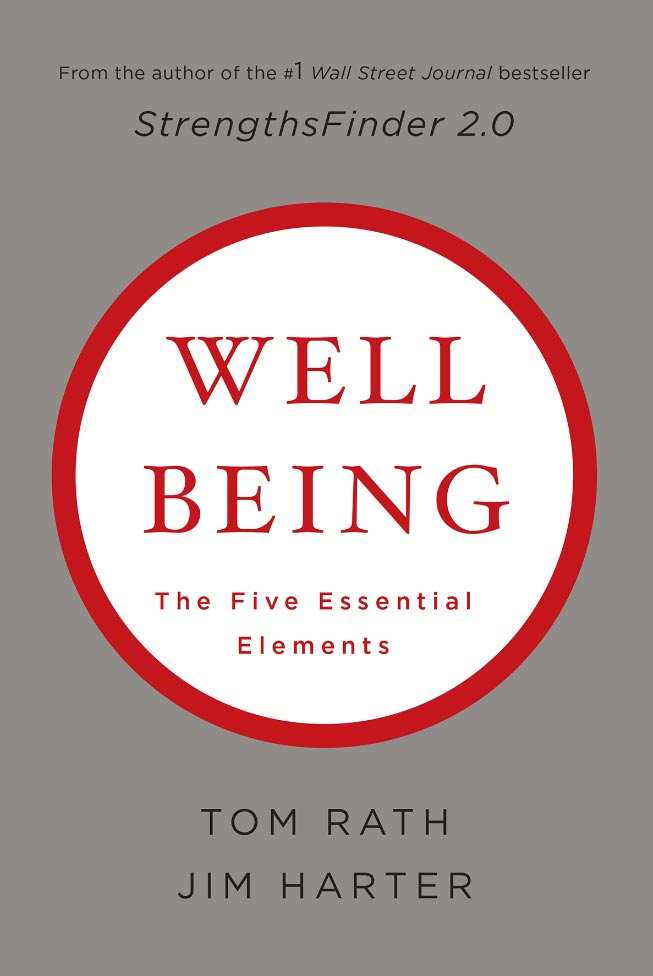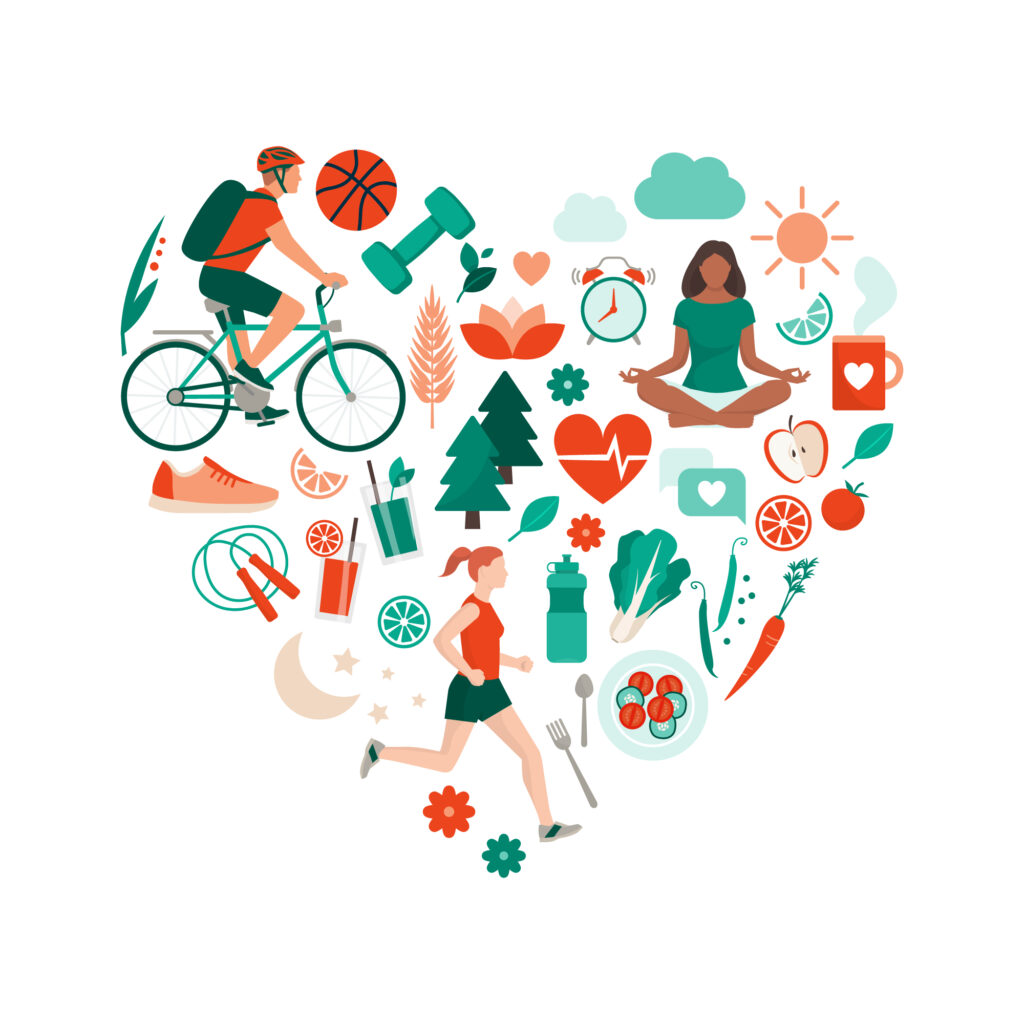Wellbeing seems to be one of the key buzzwords for the 2020s. Especially with the backdrop of Covid-19 and all the emotional, physical and financial strain it brought.
Studies around this topic have been going on for a while. Gallup scientists in the US conducted a global study of wellbeing in more than 150 countries. They asked questions about health, wealth, relationships, jobs and communities and compared results to see how people evaluate their lives overall.
From this research, Tom Rath and Jim Harter published an excellent book. It breaks down our overall wellbeing and life satisfaction into five key elements.
They describe these elements as “the currency of a life that matters”.

Community Wellbeing
First up, think about your engagement with the area you live in. Rath and Harter describe this element as having the potential to shift a good life to a great one.
Do you feel safe walking around your neighbourhood at night? How do you feel about air quality, pollution, littering and dog poo? All of these factors can affect your community wellbeing. This also helps to explain why some places are more expensive to live than others.
North Berwick is a popular seaside town here in East Lothian. It’s a draw for tourists and well-off commuters to Edinburgh. Mind you, with an average house price of £492,031 it is now the most expensive seaside town in Scotland. So this is a place where you may enjoy high community wellbeing, although financial wellbeing might come under some strain! More on that later.
It’s also important to consider your involvement in community groups and organisations. People who thrive in this area of wellbeing tend to build a wider network of friends and acquaintances. A challenge here is that it’s easier for us to opt out of groups and activities than is it to opt in. Therefore, we sometimes need motivation to move outside our short-term comfort zone in order to improve longer term wellbeing.
Social Wellbeing
This element is about having strong relationships and love in your life. And it depends a lot on how happy your friends and loved ones are themselves.
A 30 year study of more than 12,000 people found that your chances of being happy increase by 15% if a direct connection in your social network is happy.
So basically, you should interact frequently with people that have high social wellbeing if you want to be happier yourself. Is it time to review who you spend time with?
Another interesting outcome from the research is the concept of “second hand obesity”. Apparently, if your partner, sibling or a best friend becomes obese, it increases the chance of you becoming obese by between 37% and 57%. It’s time I started jogging more, for the greater good!
Physical Wellbeing
“Healthy body, healthy mind” might be a phrase that springs to mind. With this element of wellbeing, general health and fitness is key. Crucially, though, it’s about having enough energy to get things done on a daily basis.

Once again, making easy, short term choices can be to the detriment of our long-term wellbeing. We all know that a dinner of fresh salmon and broccoli will provide more energy and long-term health benefits. Yet it’s much easier, and probably cheaper, to pop a ready meal of processed food in the microwave.
We know it’s good for us to take daily exercise and work up a sweat. But it’s much easier to sit back, read a book, watch TV or scroll through social media.
It’s not all our fault. Our brains have developed to become really efficient at taking short-cuts in our decision making. That means we tend to automate decisions with minimal thinking and take the path of least resistance. Even if that means short-term decisions that lead to poor outcomes in the long term.
Ultimately, quality of sleep, a healthy diet and regular, vigorous exercise will help our overall wellbeing. But it takes effort. Not just physical effort, but mental effort too.
Career Wellbeing
This is not just for those of working age, because what this element is really getting at is life purpose. Do you enjoy what you do every day, and does it bring fulfilment?
The Gallup research found that only 20% of people answer this with a strong “yes”. Often, when we meet new people, they will ask what we do. If you find yourself answering that question with enthusiasm and fulfilment, you’re likely to be thriving in this area. That’s the case whether you are in paid work, voluntary work, or spend your time looking after family or enjoying hobbies.
A good measurement of Career Wellbeing is whether or not you enjoy weekdays as much as the weekends. That’s not to say that workdays are stress-free and easy. But slightly more stress at work should be balanced out by increased happiness overall.
Studies have shown that heart attacks are more likely to occur on Mondays. This indicates that for some, returning to work after the weekend can have physical toll.
The stress hormone, cortisol, boosts our blood pressure and blood sugar levels, but it also supresses the immune system. If we’re not spending our days in a way that brings enjoyment and fulfilment, then continued stress will have a negative physical effect on our wellbeing.
Financial Wellbeing
How well you manage your economic life underpins all 4 areas of wellbeing mentioned above. Interestingly, of the five elements of wellbeing, this is the only one that does not improve happiness in itself.
On the plus side, high levels of financial wellbeing can support the other areas of life that do bring happiness.

If you’re thriving financially, you could use money to improve social and community wellbeing by getting out and about in the community with friends. You could pay for fun sporting activities or a personal trainer to improve physical wellbeing. You may even have the confidence to leave a job you don’t fully enjoy and set up your own business.
A well-known quote by President Theodore Roosevelt is:
“Comparison is the thief of joy”
Theodore Roosevelt
This can be the downfall for many households. Traditional financial advice can often assume that we all act rationally, but in fact, study after study shows this is not true.
Think about the two scenarios below. Which would you choose?
A) An annual income of £50,000, while the people around you earn £25,000 a year
B) An annual income of £100,000, while the people around you earn £200,000 a year.
Using traditional economic assumptions, everyone would choose B. However, In the experiment by Gallup, nearly half of respondents chose A. It’s this fixation of comparison against others that can cause poor financial decision making and low financial wellbeing. And ultimately, poor financial wellbeing can have a negative impact on the other 4 elements of wellbeing too.
You can read more about financial wellbeing in my blog here.
Summary
If this article has struck a chord with you, I’d recommend the Wellbeing book by Tom Rath and Jim Harter. Overall, it’s research found that 66% of people are doing well in at least one of the five elements, which sounds decent. On the other hand, only 7% are thriving in all five.
If you’re interested in assessing your own wellbeing, there are many questionnaires online. But one that links specifically to the Gallup research can be completed via a unique access code, provided inside the Wellbeing book by Rath and Harter.
A good financial coach will help you take a wide view of your overall wellbeing and not just focus on financial solutions. Remember, financial wellbeing is an enabler for the other four elements. It should be about how money can be used to make you happier, not just wealthier.
My initial chats with potential clients begin with an invitation to rate your own five elements of wellbeing, on a scale of 1 to 5. If you’d like to give it a try, get in touch here.




 Production
Production
